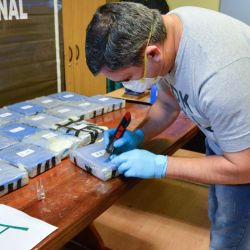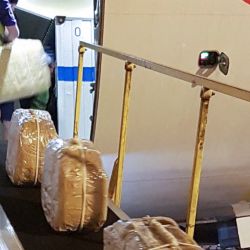A Russian court on Thursday sentenced four men to lengthy jail terms for trying to smuggle nearly 400 kilogrammes of cocaine in suitcases from the Russian Embassy in Argentina.
In a strange case dating back to 2018, Argentine authorities seized the cocaine, worth US$62 million (55 million euros), hidden in suitcases in the Russian Embassy school.
Moscow's Dorogomilovsky district court sentenced the alleged mastermind, Andrei Kovalchuk, to 18 years, his lawyer Sergei Yurosh told AFP, but said they planned to appeal.
A former employee of the Russian Embassy in Argentina, Ali Abyanov, was handed a 17-year jail term.
Two other men, who had reportedly tried to move the suitcases from a Foreign Ministry storage facility in Moscow, were sentenced to 16 and 13 years respectively.
The plot was foiled when investigators replaced the drugs with flour to monitor the gang in a joint Russian-Argentine operation.
Kovalchuk was arrested in Germany in 2018 after going on the run, and extradited to Russia the same year.
All four firmly proclaimed their innocence during the trial.
Two other Russian suspects, who also hold Argentinean nationality, are currently on trial in Argentina.
The story was broken by Argentina's Interior Ministry in February 2018. The also case sparked controversy in Russia at the time, when media in both nations questioned contradictory official accounts of events.
Patricia Bullrich, Argentina's then-security minister, said that the gang had sought to use the Russian diplomatic courier service to fly the cocaine to Europe.
But when Argentine police released images of a Russian aircraft used in the sting operation and bearing the number of security council chief Nikolai Patrushev's plane, the Kremlin denied any of its fleet had been involved.
Argentine investigators believe the cocaine – which they described as being very pure – likely originated in Colombia or Peru.
The drugs were destined for Russia and, it is believed, for Germany, where Kovalchuk lived.
Russian and Argentine police mounted the sting operation after the Russian ambassador informed authorities of the drugs find in 2016. Investigators went to a wholesale market in Buenos Aires that same night to buy the 400 kilogrammes of flour which replaced the cocaine.
In the following months, members of the network, some of whom worked at the Embassy, tried several times in vain to send the flour to Russia, all under the surveillance of Russian and Argentinean investigators.
– TIMES/AFP
related news
"luggage" - Google News
January 21, 2022 at 12:36AM
https://ift.tt/3KsecNN
Russian court jails four in 2018 embassy luggage cocaine case - Buenos Aires Times
"luggage" - Google News
https://ift.tt/2MXqDoI
Shoes Man Tutorial
Pos News Update
Meme Update
Korean Entertainment News
Japan News Update



Tidak ada komentar:
Posting Komentar